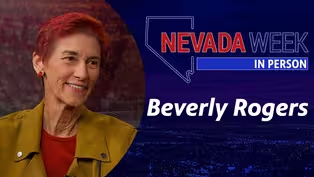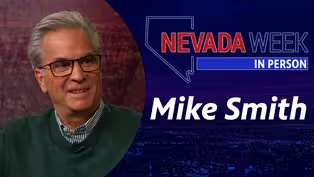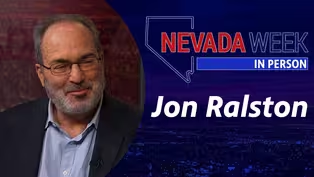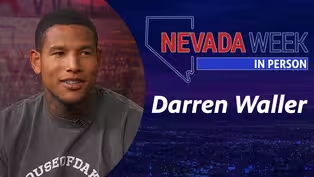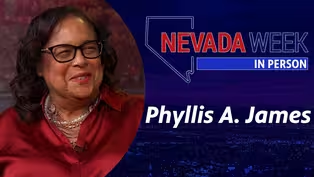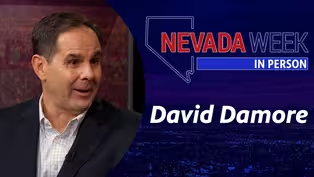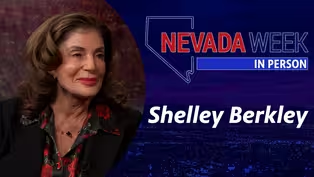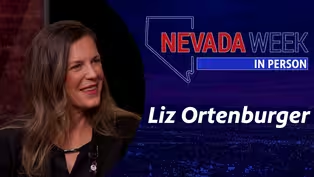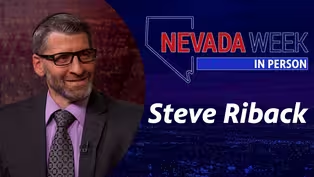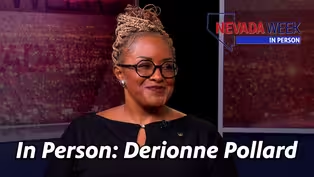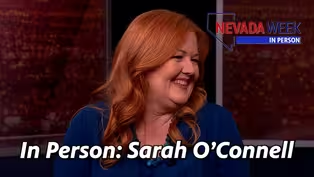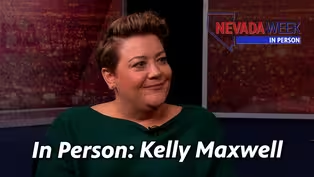
Nevada Week In Person | Terri Chandler
Season 1 Episode 27 | 14mVideo has Closed Captions
We talk one-on-one with the founder of Future Smiles, Terri Chandler.
We talk one-on-one with the founder of Future Smiles, Terri Chandler.
Problems playing video? | Closed Captioning Feedback
Problems playing video? | Closed Captioning Feedback
Nevada Week In Person is a local public television program presented by Vegas PBS

Nevada Week In Person | Terri Chandler
Season 1 Episode 27 | 14mVideo has Closed Captions
We talk one-on-one with the founder of Future Smiles, Terri Chandler.
Problems playing video? | Closed Captioning Feedback
How to Watch Nevada Week In Person
Nevada Week In Person is available to stream on pbs.org and the free PBS App, available on iPhone, Apple TV, Android TV, Android smartphones, Amazon Fire TV, Amazon Fire Tablet, Roku, Samsung Smart TV, and Vizio.
Providing Support for PBS.org
Learn Moreabout PBS online sponsorshipMore from This Collection
Nevada Week In Person goes beyond the roundtable discussion of Nevada Week with guests for a more casual conversation about their personal passions, new projects and compelling stories that are overlooked in the flurry of the news cycle.
Nevada Week In Person | Beverly Rogers
Video has Closed Captions
One-on-one interview with Rogers Foundation chair Beverly Rogers. (14m)
Nevada Week In Person | Mike Smith
Video has Closed Captions
One-on-one interview with Las Vegas Sun political cartoonist Mike Smith. (14m)
Nevada Week In Person | Jon Ralston
Video has Closed Captions
One-on-one interview with The Nevada Independent CEO Jon Ralston. (14m)
Nevada Week In Person | Darren Waller
Video has Closed Captions
One-on-one interview with Las Vegas Raider tight end Darren Waller. (14m)
Nevada Week In Person | Phyllis A. James
Video has Closed Captions
One-on-one interview Phyllis A. James. (14m)
Nevada Week In Person | David Damore
Video has Closed Captions
One-on-one interview with Chair of the Department of Political Science at UNLV David Damor (14m)
Nevada Week In Person | Shelley Berkley
Video has Closed Captions
One-on-one interview Senior Vice President for Touro University Shelley Berkley. (14m)
Nevada Week In Person | Liz Ortenburger
Video has Closed Captions
One-on-one interview with SafeNest CEO Liz Ortenburger. (14m)
Nevada Week In Person | Steve Riback
Video has Closed Captions
One-on-one interview with Las Vegas Metro Police Lieutenant Steve Riback. (14m)
Nevada Week In Person | DeRionne Pollard
Video has Closed Captions
One-on-one interview Nevada State College President DeRionne Pollard. (14m)
Nevada Week In Person | Sarah O’Connell
Video has Closed Captions
One-on-one interview with Director of Eat More Art LLC Sarah O’Connell. (14m)
Nevada Week In Person | Kelly Maxwell
Video has Closed Captions
One-on-one interview with Baby’s Bounty Executive Director Kelly Maxwell. (14m)
Providing Support for PBS.org
Learn Moreabout PBS online sponsorshipAn oral health advocate whose nonprofit has served 170,000 children in Southern Nevada, Terri Chandler, founder and executive director of Future Smiles, joins us this week for Nevada Week In Person.
♪♪♪ Support for Nevada Week In Person is provided by Senator William H. Hernstadt and additional supporting sponsors.
Welcome to Nevada Week In Person.
I'm Amber Renee Dixon.
A public health dental hygienist with more than 40 years of experience, she helped get fluoride added to Clark County's water and in 2009 founded Future Smiles, a nonprofit providing dental services to Southern Nevada's needy children.
Terri Chandler, thank you so much for joining us.
-It's my pleasure, Amber.
-Full disclosure, I am a board member of Future Smiles.
I have a passion for dental health.
We're going to talk more about Future Smiles in a bit, but let's start with some of your background.
You are a military brat, as you've told me.
Born in Yuma, Arizona and moved to Las Vegas when you were 13.
Why did you move here, and how did you get interested in dentistry?
(Terri Chandler) My dad moved here when he retired from the Navy.
There was a lot of job opportunity for veterans in Las Vegas, and he was delighted to work for Michael Gaughan at the Barbary Coast.
I do remember my dad-- I think he must have had a 27-year career at the Barbary Coast.
It was a second career for him.
He really enjoyed the gaming industry.
Dentistry, I have always wanted to help people, and dentistry has been a very good fit for me.
It is a combination of science, engineering, artistry and people.
So it's been a wonderful fit for me, and I've had a wonderful career.
I started as a dental assistant.
Then when I lived in Cleveland, Ohio, I attended Case Western Reserve University's expanded function dental auxilary program, where they taught us to place and finish fillings, which is very much what dental therapists are doing today.
And then in 1999, I attended the College of Southern Nevada and graduated as a dental hygienist.
-Wonderful.
At what point though do you remember thinking, I want to be inside people's mouths.
That's not a very appealing perhaps job to some people, but to you?
-Well, you know, I started out, I went to UNLV and I was part of the X-ray tech program, and barium enemas were not my thing.
So I went to dentistry thinking that might be another science career pathway that I could help people and again, it has been a great journey for me.
-When you were at CSN, you were a part of efforts to get fluoride added to Clark County's water.
Why and what does that mean for our water right now?
-Yes.
So as a dental hygiene student at CSN, we were asked to choose a community service project.
My colleague Chris Garvey and I, we selected community water fluoridation.
There was a bill going to the legislature that year, it successfully passed, and Southern Nevada is the only county in Nevada with water fluoridation.
The research shows that water fluoridation will reduce dental decay by 25%, and it's noted as one of the ten health advantages and efforts in the 20th century.
So water fluoridation is a simple way to help eradicate tooth decay in a broad population of people.
-I know when I go to the dentist, they always offer to add a fluoride treatment.
What does that do, it strengthens teeth, correct?
-Correct.
It strengthens your enamel, so it's very beneficial.
-Okay.
Talk about Future Smiles.
Why did you start it, and was there something related to the recession that inspired this?
-So water fluoridation is kind of an interesting segue.
During that time period, we met a lady named Louise Helton who was the chairperson for the coalition that was initiating that water fluoridation.
Louise also some years later was instrumental in building three school-based health centers.
She worked with the Clark County School District, Communities in Schools and NAIOP.
Those three health centers still are in existence today, and the first location for Future Smiles was at one of those buildings because there was a dental chair.
She was never able to put a dental program together, but I asked, could I start a dental hygiene program?
So in 2009 with that one dental chair, my friends Chris, Stephanie and I saw 155 children.
Of those 76% were uninsured, and over half had dental decay.
So it really motivated us and inspired us to come into this community and create more dental opportunities for these underserved children.
-Without that, what would the situation be like?
How prevalent are dental issues among our youth?
-Oh, they're significant.
They are significant and currently post-pandemic we are seeing a rise in tooth decay.
I talked to a teacher the other day, and she shared with me that over the two years of the pandemic children were wearing a mask so you didn't see children's teeth.
You didn't see their smiles.
Now that they are unmasked, she is seeing numerous children with cavities, visually large cavities in their front teeth that she can see.
She was shocked, and she asked me, what can we do?
You know, we need to navigate these children to the care pathway.
-When you talk about dentistry, do you think that people, when they're considering donating, even think about that aspect of a child's healthcare?
We think about food and maybe doctor visits, but where does dental health come in?
-You know, for me everyone should have dental health.
Everyone should have teeth they are comfortable with and able to use in their day-to-day lives.
They should live free from dental pain.
But unfortunately dental health is looked at as non-essential.
Our policymakers and society sometimes think of these other social causes as being very essential, and dental health is not as essential in their minds and does not gain the same type of support.
I sometimes think some of that is the health insurance system itself, because medical is separate and then you have dental health, you have vision and you have mental health, which are all considered insurance add-ons.
They're extras.
They're nice to have, but they're not essential in the main line of medical insurance.
So in some ways, the system itself is actually propagating these social disparities, and it reminds me of a story.
There was a mom that I saw, Jamie, and Jamie shared with me that when you don't make a lot of money, you put things off that are expensive, which dental care is very expensive.
It almost feels like it's out of reach for these families.
So Jamie brings to light that it's so important for us to help underserved families and to understand that these parents love their children.
-The children that you are seeing-- well, one thing that makes Future Smiles unique and so special is you are on the school campuses providing the services right then and there.
But the kids that you are seeing, they tend to have insurance or they have Medicaid, how does that work?
-It's a huge disparity.
Since we started Future Smiles, anywhere from 76% to 50% of the kids are uninsured and the rest are on Medicaid.
These are children of poverty.
They are living in families of five living on $1,900 a month.
So like Jamie said, they don't have the extra resources to provide dental care for their children because it's so expensive.
-A story you told me once that stood out is sometimes families will share just one toothbrush, and you've seen that.
Please tell me about the dental sealants though, and how unique that is and how you do it and what it helps.
-The science of dental sealants has been around for well over 50 years.
So what it is it's a protective coating that goes on the biting surfaces and it prevents cavities.
It can prevent up to 80% of cavities according to the CDC.
We're using a new product that's called a glass ionomer that releases fluoride.
We're seeing very significant results from that dental sealant, and what's kind of cool is when you bring dental professionals into the school environment, kids are seeing dentists, they're seeing dental hygienists, and they are aspiring to be those professionals later on in their lives.
If you've never seen a dentist, how do you even know what a dentist does?
-And we go back to that toothbrush story.
You provide "smile bags" as well.
What are they, and who do they go to?
Is this when a child comes in for treatment, or is it other opportunities?
-So Future Smiles has three pillars of care.
The first one is oral health education and tooth brushing supplies.
We go into 60 schools, and we provide brushing supplies for all children in those schools, so it's about 50,000 children that get a smile bag.
Then we return back to the school with the school sealant program, and those dental hygienists will provide direct services, those dental sealants, on those children.
That side of the program serves about 5,000 children a year.
We need positive parent consent to treat, and we still go back to those 50 or 60 schools to provide the sealant program.
Then the third arm of the program is our dental wellness center where we have a dentist and we can provide comprehensive dental care, and we are seeing about 1,200 children at the dental wellness center.
-What are in those smile bags?
-Toothbrushes, toothpaste, dental floss, a toothbrush cover and a timer, two-minute timer, so they know how long to brush.
-When you are going into these schools, how educated do you find students are on how to brush their teeth?
-You know, they're delightful.
You go into a school community, and the children are just ready to talk to you.
They'll tell you what they had for breakfast, they'll tell you that they brushed in the morning.
They will share that they share a toothbrush.
Sometimes it's with their brother or sister, sometimes it's with the whole family members.
It's just really hard for struggling families to make ends meet, particularly nowadays.
I mean, right now the price of gas is up, food is more expensive.
They're really making difficult decisions: What do we absolutely need and what can we do without?
-And that's where dental supplies come into play.
How much education is part of Future Smiles?
-It's the pillar because as a dental hygienist, I took an oath to make sure that other people's dental health is a priority of mine through education and services.
So that education is a component that they can carry with them throughout their lives, and we believe it's multi-generational.
If you learn how to brush your teeth, you will talk to your mom and dad, your siblings, your grandparents and show them what you learned.
You will show them how to brush their teeth.
-And when you are teaching, you're using a stuffed animal that has a giant set of teeth.
So what is the rule of thumb, it's two minutes?
-Two minutes, brush in circles.
-I don't think most people do that.
-Try to get at the gum line, and then also using a flossing entity that will go in between the teeth whether you're using a floss holder or regular floss.
-How many of the students are you seeing that are in dental pain?
-One in four.
One in four children share with us that they have dental pain, and they have high significant dental needs.
In fact during the pandemic, we stayed open.
So the dental wellness center saw 1,500 children during that time period.
Of those, 500 had significant dental pain and dental needs.
So we'd like to think we kept them out of the emergency room.
-And when you think about having dental pain, how bad that can be, how could a student possibly concentrate in school?
-It affects every aspect of their life.
Dental pain causes an inability to eat, makes it difficult to sleep at night, makes it difficult to pay attention in school, and they will miss school because they have pain and their parents don't know what to do.
-There were some studies that connected dental health to COVID.
-Correct.
So what the researchers found early on in COVID is that when a person has poor oral health, they are three times more likely to have complications of COVID, and they are four times more likely to be on a ventilator, and they are nine times more likely to die from COVID complications than someone that is in good health.
And if you think about it, coronavirus is a respiratory infection.
So if you have high levels of bacteria from tooth decay and gum disease, that's going to invade those fragile lung tissues that have been compromised already, further compromising them.
-Good reason to... -Brush and floss.
-Yes, exactly.
You're coming back from D.C. where you received an award.
Tell me about that.
-Yes.
So this year I was recognized as a cohort of the 2022 AARP Purpose Prize recipients.
I'm one of the Purpose Prize fellows.
So a week ago, AARP flew all of us out, all 14 of us, to their D.C. office and had a day of professional development.
It was amazing.
I'm deeply honored and privileged to be part of that group.
-How many people from all over the country received this honor?
-Only 14.
Three was well over a thousand applicants, and they do this Purpose Prize application.
It's very highly vetted, and they do it once a year.
-And when you speak to these people and inform them about what you do, what do you find sticks out to them?
-You know, they find that we all have a passion for social causes and we're all trying to help different populations in different ways, but dental health interconnects with almost all of them in the work that they're doing.
And we all spoke about that.
-How well do you think that's understood, that dental health can impact the entirety of your body?
-I think that it is understood.
What I do think is happening is that it's not viewed as essential.
Even when we were applying for the ARPA money that was coming for coronavirus relief, we were told we were not in the first tier, that they were looking at food, they were looking at mental health, that dental health is in there but it was further down.
-Terri Chandler, thank you so much for your time and for joining us here on Nevada Week In Person.
To see this week's edition of Nevada Week, tune in on Sunday night at 5:30, Tuesday night at 7:30 or anytime you wish at vegaspbs.org/nevadaweek.
That is also where you can find this interview and many more from Nevada Week In Person.
Thank you for watching.
♪♪♪

- News and Public Affairs

Top journalists deliver compelling original analysis of the hour's headlines.

- News and Public Affairs

FRONTLINE is investigative journalism that questions, explains and changes our world.












Support for PBS provided by:
Nevada Week In Person is a local public television program presented by Vegas PBS
